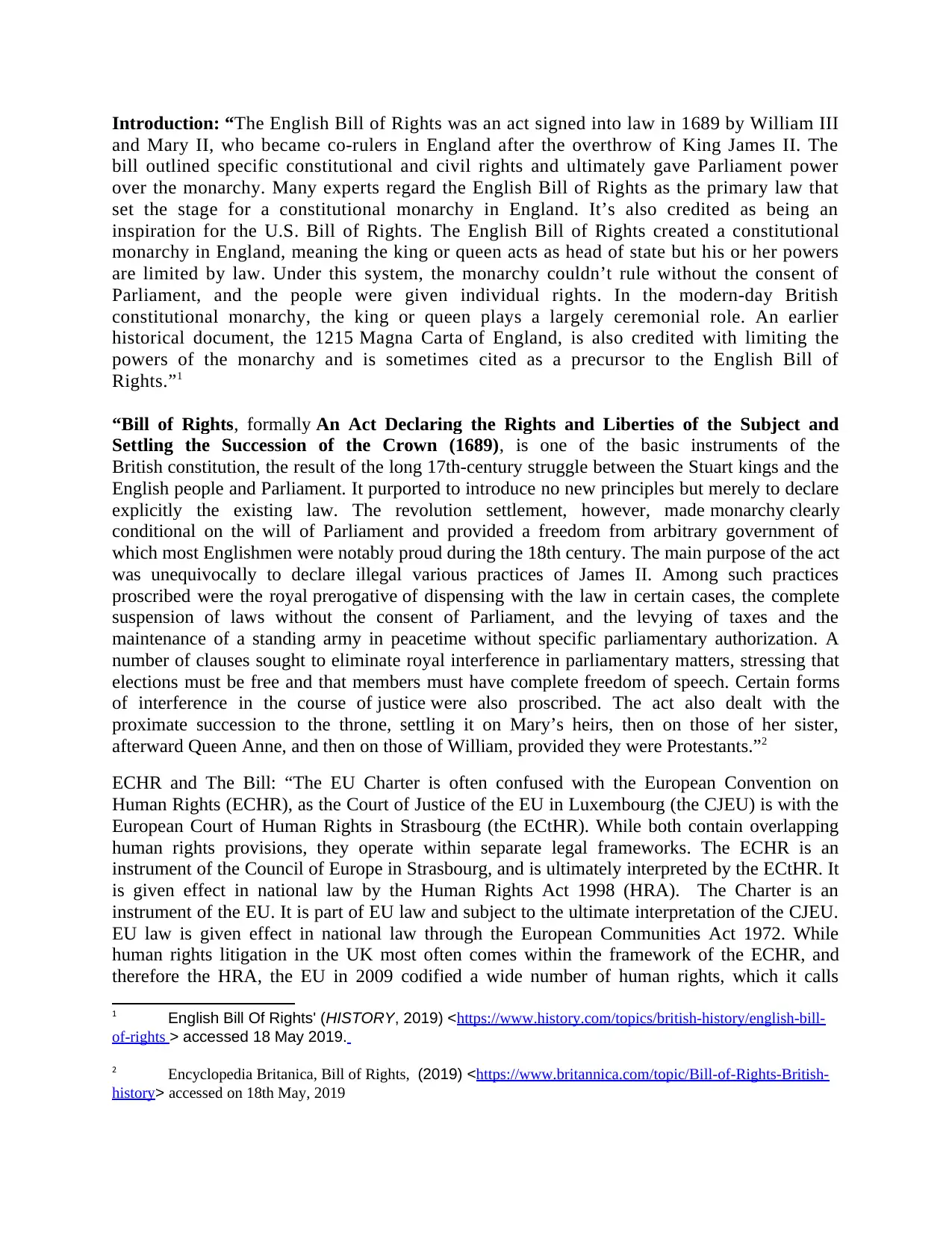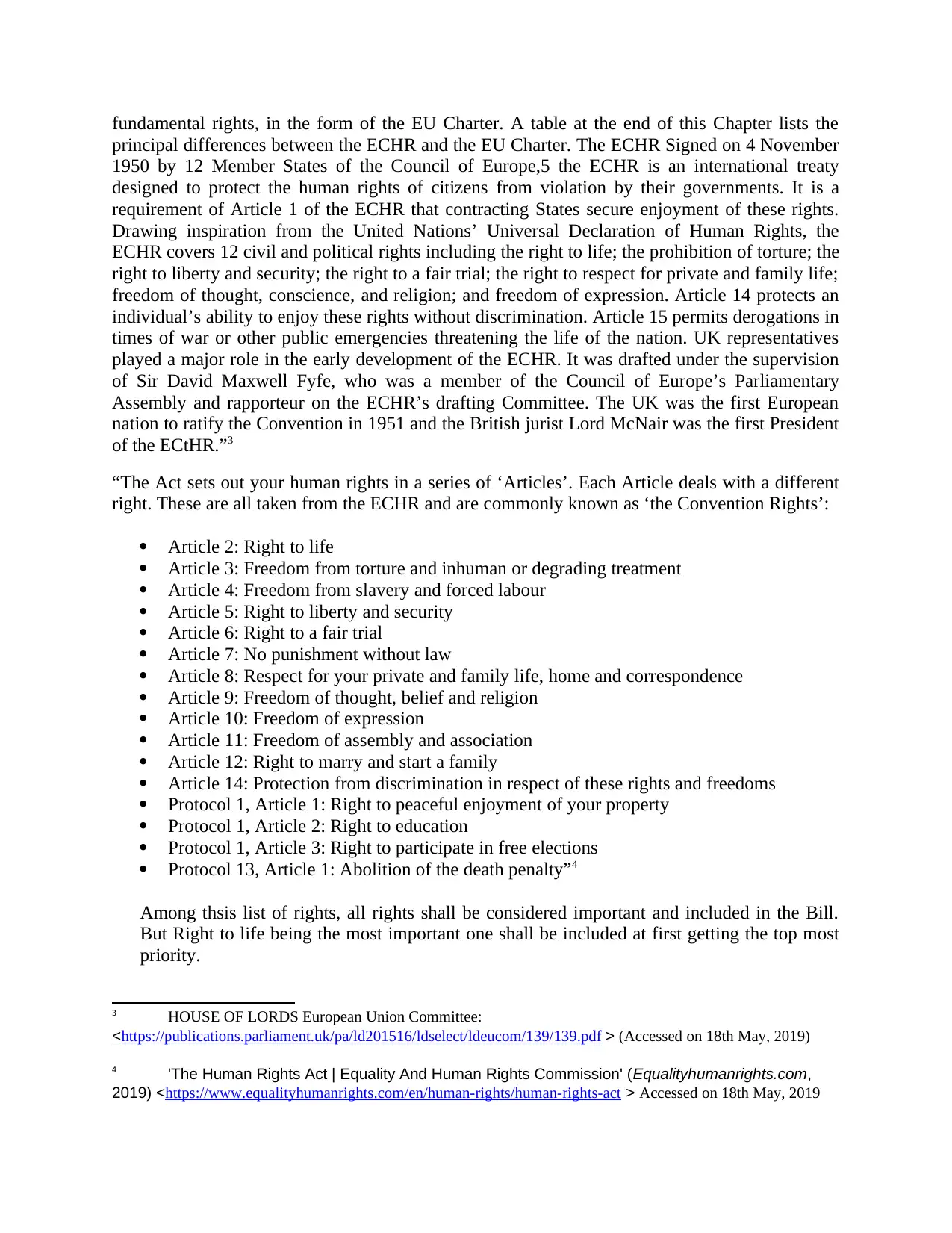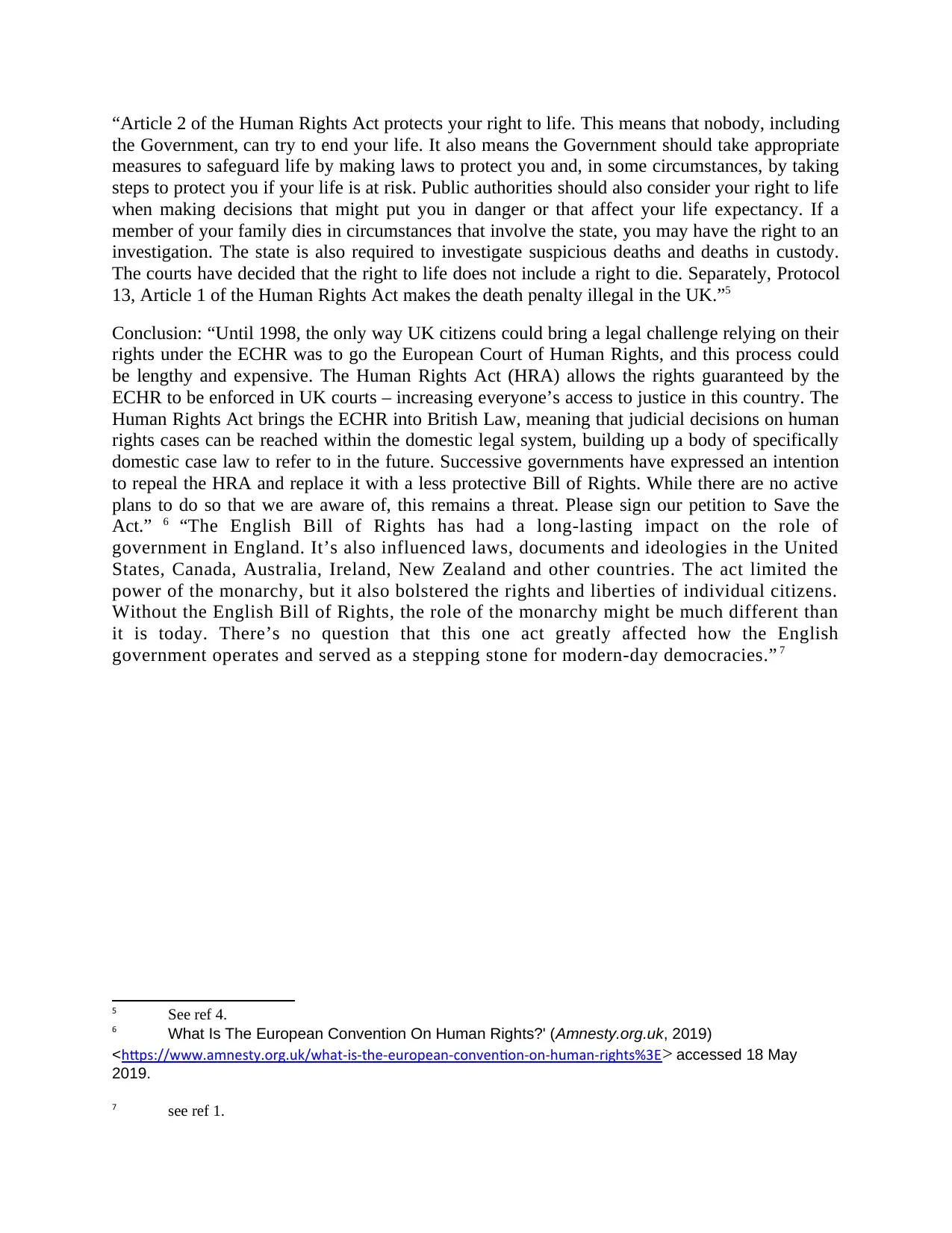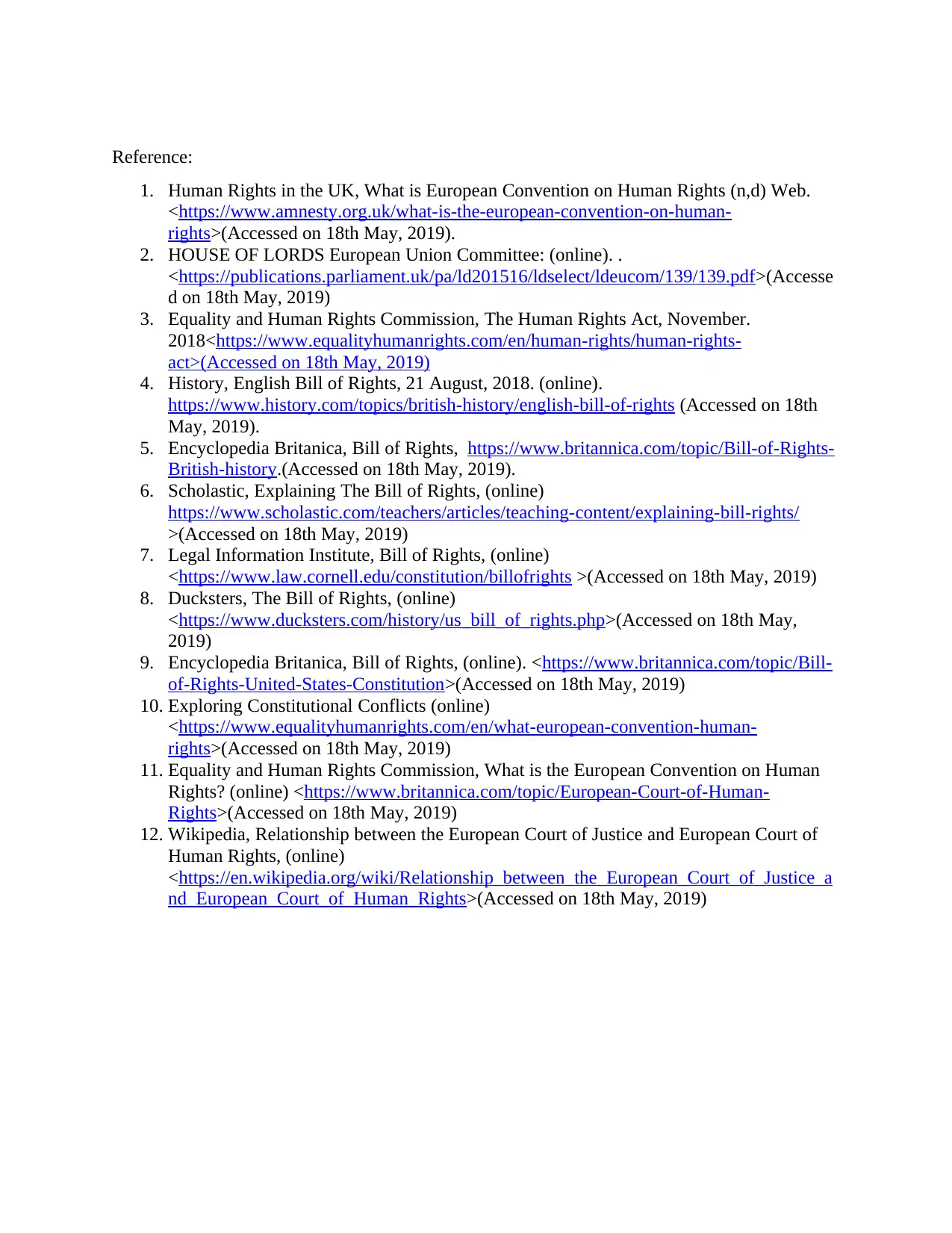The English Bill of Rights: A Key Step Towards Constitutional Monarchy
VerifiedAdded on 2023/03/23
|4
|2080
|97
AI Summary
The English Bill of Rights, signed into law in 1689, outlined constitutional and civil rights and gave Parliament power over the monarchy. It created a constitutional monarchy in England and influenced the development of modern-day democracies. This article explores the history and impact of the English Bill of Rights.
Contribute Materials
Your contribution can guide someone’s learning journey. Share your
documents today.

Introduction: “The English Bill of Rights was an act signed into law in 1689 by William III
and Mary II, who became co-rulers in England after the overthrow of King James II. The
bill outlined specific constitutional and civil rights and ultimately gave Parliament power
over the monarchy. Many experts regard the English Bill of Rights as the primary law that
set the stage for a constitutional monarchy in England. It’s also credited as being an
inspiration for the U.S. Bill of Rights. The English Bill of Rights created a constitutional
monarchy in England, meaning the king or queen acts as head of state but his or her powers
are limited by law. Under this system, the monarchy couldn’t rule without the consent of
Parliament, and the people were given individual rights. In the modern-day British
constitutional monarchy, the king or queen plays a largely ceremonial role. An earlier
historical document, the 1215 Magna Carta of England, is also credited with limiting the
powers of the monarchy and is sometimes cited as a precursor to the English Bill of
Rights.”1
“Bill of Rights, formally An Act Declaring the Rights and Liberties of the Subject and
Settling the Succession of the Crown (1689), is one of the basic instruments of the
British constitution, the result of the long 17th-century struggle between the Stuart kings and the
English people and Parliament. It purported to introduce no new principles but merely to declare
explicitly the existing law. The revolution settlement, however, made monarchy clearly
conditional on the will of Parliament and provided a freedom from arbitrary government of
which most Englishmen were notably proud during the 18th century. The main purpose of the act
was unequivocally to declare illegal various practices of James II. Among such practices
proscribed were the royal prerogative of dispensing with the law in certain cases, the complete
suspension of laws without the consent of Parliament, and the levying of taxes and the
maintenance of a standing army in peacetime without specific parliamentary authorization. A
number of clauses sought to eliminate royal interference in parliamentary matters, stressing that
elections must be free and that members must have complete freedom of speech. Certain forms
of interference in the course of justice were also proscribed. The act also dealt with the
proximate succession to the throne, settling it on Mary’s heirs, then on those of her sister,
afterward Queen Anne, and then on those of William, provided they were Protestants.”2
ECHR and The Bill: “The EU Charter is often confused with the European Convention on
Human Rights (ECHR), as the Court of Justice of the EU in Luxembourg (the CJEU) is with the
European Court of Human Rights in Strasbourg (the ECtHR). While both contain overlapping
human rights provisions, they operate within separate legal frameworks. The ECHR is an
instrument of the Council of Europe in Strasbourg, and is ultimately interpreted by the ECtHR. It
is given effect in national law by the Human Rights Act 1998 (HRA). The Charter is an
instrument of the EU. It is part of EU law and subject to the ultimate interpretation of the CJEU.
EU law is given effect in national law through the European Communities Act 1972. While
human rights litigation in the UK most often comes within the framework of the ECHR, and
therefore the HRA, the EU in 2009 codified a wide number of human rights, which it calls
1 English Bill Of Rights' (HISTORY, 2019) <https://www.history.com/topics/british-history/english-bill-
of-rights > accessed 18 May 2019.
2 Encyclopedia Britanica, Bill of Rights, (2019) <https://www.britannica.com/topic/Bill-of-Rights-British-
history> accessed on 18th May, 2019
and Mary II, who became co-rulers in England after the overthrow of King James II. The
bill outlined specific constitutional and civil rights and ultimately gave Parliament power
over the monarchy. Many experts regard the English Bill of Rights as the primary law that
set the stage for a constitutional monarchy in England. It’s also credited as being an
inspiration for the U.S. Bill of Rights. The English Bill of Rights created a constitutional
monarchy in England, meaning the king or queen acts as head of state but his or her powers
are limited by law. Under this system, the monarchy couldn’t rule without the consent of
Parliament, and the people were given individual rights. In the modern-day British
constitutional monarchy, the king or queen plays a largely ceremonial role. An earlier
historical document, the 1215 Magna Carta of England, is also credited with limiting the
powers of the monarchy and is sometimes cited as a precursor to the English Bill of
Rights.”1
“Bill of Rights, formally An Act Declaring the Rights and Liberties of the Subject and
Settling the Succession of the Crown (1689), is one of the basic instruments of the
British constitution, the result of the long 17th-century struggle between the Stuart kings and the
English people and Parliament. It purported to introduce no new principles but merely to declare
explicitly the existing law. The revolution settlement, however, made monarchy clearly
conditional on the will of Parliament and provided a freedom from arbitrary government of
which most Englishmen were notably proud during the 18th century. The main purpose of the act
was unequivocally to declare illegal various practices of James II. Among such practices
proscribed were the royal prerogative of dispensing with the law in certain cases, the complete
suspension of laws without the consent of Parliament, and the levying of taxes and the
maintenance of a standing army in peacetime without specific parliamentary authorization. A
number of clauses sought to eliminate royal interference in parliamentary matters, stressing that
elections must be free and that members must have complete freedom of speech. Certain forms
of interference in the course of justice were also proscribed. The act also dealt with the
proximate succession to the throne, settling it on Mary’s heirs, then on those of her sister,
afterward Queen Anne, and then on those of William, provided they were Protestants.”2
ECHR and The Bill: “The EU Charter is often confused with the European Convention on
Human Rights (ECHR), as the Court of Justice of the EU in Luxembourg (the CJEU) is with the
European Court of Human Rights in Strasbourg (the ECtHR). While both contain overlapping
human rights provisions, they operate within separate legal frameworks. The ECHR is an
instrument of the Council of Europe in Strasbourg, and is ultimately interpreted by the ECtHR. It
is given effect in national law by the Human Rights Act 1998 (HRA). The Charter is an
instrument of the EU. It is part of EU law and subject to the ultimate interpretation of the CJEU.
EU law is given effect in national law through the European Communities Act 1972. While
human rights litigation in the UK most often comes within the framework of the ECHR, and
therefore the HRA, the EU in 2009 codified a wide number of human rights, which it calls
1 English Bill Of Rights' (HISTORY, 2019) <https://www.history.com/topics/british-history/english-bill-
of-rights > accessed 18 May 2019.
2 Encyclopedia Britanica, Bill of Rights, (2019) <https://www.britannica.com/topic/Bill-of-Rights-British-
history> accessed on 18th May, 2019
Secure Best Marks with AI Grader
Need help grading? Try our AI Grader for instant feedback on your assignments.

fundamental rights, in the form of the EU Charter. A table at the end of this Chapter lists the
principal differences between the ECHR and the EU Charter. The ECHR Signed on 4 November
1950 by 12 Member States of the Council of Europe,5 the ECHR is an international treaty
designed to protect the human rights of citizens from violation by their governments. It is a
requirement of Article 1 of the ECHR that contracting States secure enjoyment of these rights.
Drawing inspiration from the United Nations’ Universal Declaration of Human Rights, the
ECHR covers 12 civil and political rights including the right to life; the prohibition of torture; the
right to liberty and security; the right to a fair trial; the right to respect for private and family life;
freedom of thought, conscience, and religion; and freedom of expression. Article 14 protects an
individual’s ability to enjoy these rights without discrimination. Article 15 permits derogations in
times of war or other public emergencies threatening the life of the nation. UK representatives
played a major role in the early development of the ECHR. It was drafted under the supervision
of Sir David Maxwell Fyfe, who was a member of the Council of Europe’s Parliamentary
Assembly and rapporteur on the ECHR’s drafting Committee. The UK was the first European
nation to ratify the Convention in 1951 and the British jurist Lord McNair was the first President
of the ECtHR.”3
“The Act sets out your human rights in a series of ‘Articles’. Each Article deals with a different
right. These are all taken from the ECHR and are commonly known as ‘the Convention Rights’:
Article 2: Right to life
Article 3: Freedom from torture and inhuman or degrading treatment
Article 4: Freedom from slavery and forced labour
Article 5: Right to liberty and security
Article 6: Right to a fair trial
Article 7: No punishment without law
Article 8: Respect for your private and family life, home and correspondence
Article 9: Freedom of thought, belief and religion
Article 10: Freedom of expression
Article 11: Freedom of assembly and association
Article 12: Right to marry and start a family
Article 14: Protection from discrimination in respect of these rights and freedoms
Protocol 1, Article 1: Right to peaceful enjoyment of your property
Protocol 1, Article 2: Right to education
Protocol 1, Article 3: Right to participate in free elections
Protocol 13, Article 1: Abolition of the death penalty”4
Among thsis list of rights, all rights shall be considered important and included in the Bill.
But Right to life being the most important one shall be included at first getting the top most
priority.
3 HOUSE OF LORDS European Union Committee:
<https://publications.parliament.uk/pa/ld201516/ldselect/ldeucom/139/139.pdf > (Accessed on 18th May, 2019)
4 'The Human Rights Act | Equality And Human Rights Commission' (Equalityhumanrights.com,
2019) <https://www.equalityhumanrights.com/en/human-rights/human-rights-act > Accessed on 18th May, 2019
principal differences between the ECHR and the EU Charter. The ECHR Signed on 4 November
1950 by 12 Member States of the Council of Europe,5 the ECHR is an international treaty
designed to protect the human rights of citizens from violation by their governments. It is a
requirement of Article 1 of the ECHR that contracting States secure enjoyment of these rights.
Drawing inspiration from the United Nations’ Universal Declaration of Human Rights, the
ECHR covers 12 civil and political rights including the right to life; the prohibition of torture; the
right to liberty and security; the right to a fair trial; the right to respect for private and family life;
freedom of thought, conscience, and religion; and freedom of expression. Article 14 protects an
individual’s ability to enjoy these rights without discrimination. Article 15 permits derogations in
times of war or other public emergencies threatening the life of the nation. UK representatives
played a major role in the early development of the ECHR. It was drafted under the supervision
of Sir David Maxwell Fyfe, who was a member of the Council of Europe’s Parliamentary
Assembly and rapporteur on the ECHR’s drafting Committee. The UK was the first European
nation to ratify the Convention in 1951 and the British jurist Lord McNair was the first President
of the ECtHR.”3
“The Act sets out your human rights in a series of ‘Articles’. Each Article deals with a different
right. These are all taken from the ECHR and are commonly known as ‘the Convention Rights’:
Article 2: Right to life
Article 3: Freedom from torture and inhuman or degrading treatment
Article 4: Freedom from slavery and forced labour
Article 5: Right to liberty and security
Article 6: Right to a fair trial
Article 7: No punishment without law
Article 8: Respect for your private and family life, home and correspondence
Article 9: Freedom of thought, belief and religion
Article 10: Freedom of expression
Article 11: Freedom of assembly and association
Article 12: Right to marry and start a family
Article 14: Protection from discrimination in respect of these rights and freedoms
Protocol 1, Article 1: Right to peaceful enjoyment of your property
Protocol 1, Article 2: Right to education
Protocol 1, Article 3: Right to participate in free elections
Protocol 13, Article 1: Abolition of the death penalty”4
Among thsis list of rights, all rights shall be considered important and included in the Bill.
But Right to life being the most important one shall be included at first getting the top most
priority.
3 HOUSE OF LORDS European Union Committee:
<https://publications.parliament.uk/pa/ld201516/ldselect/ldeucom/139/139.pdf > (Accessed on 18th May, 2019)
4 'The Human Rights Act | Equality And Human Rights Commission' (Equalityhumanrights.com,
2019) <https://www.equalityhumanrights.com/en/human-rights/human-rights-act > Accessed on 18th May, 2019

“Article 2 of the Human Rights Act protects your right to life. This means that nobody, including
the Government, can try to end your life. It also means the Government should take appropriate
measures to safeguard life by making laws to protect you and, in some circumstances, by taking
steps to protect you if your life is at risk. Public authorities should also consider your right to life
when making decisions that might put you in danger or that affect your life expectancy. If a
member of your family dies in circumstances that involve the state, you may have the right to an
investigation. The state is also required to investigate suspicious deaths and deaths in custody.
The courts have decided that the right to life does not include a right to die. Separately, Protocol
13, Article 1 of the Human Rights Act makes the death penalty illegal in the UK.”5
Conclusion: “Until 1998, the only way UK citizens could bring a legal challenge relying on their
rights under the ECHR was to go the European Court of Human Rights, and this process could
be lengthy and expensive. The Human Rights Act (HRA) allows the rights guaranteed by the
ECHR to be enforced in UK courts – increasing everyone’s access to justice in this country. The
Human Rights Act brings the ECHR into British Law, meaning that judicial decisions on human
rights cases can be reached within the domestic legal system, building up a body of specifically
domestic case law to refer to in the future. Successive governments have expressed an intention
to repeal the HRA and replace it with a less protective Bill of Rights. While there are no active
plans to do so that we are aware of, this remains a threat. Please sign our petition to Save the
Act.” 6 “The English Bill of Rights has had a long-lasting impact on the role of
government in England. It’s also influenced laws, documents and ideologies in the United
States, Canada, Australia, Ireland, New Zealand and other countries. The act limited the
power of the monarchy, but it also bolstered the rights and liberties of individual citizens.
Without the English Bill of Rights, the role of the monarchy might be much different than
it is today. There’s no question that this one act greatly affected how the English
government operates and served as a stepping stone for modern-day democracies.” 7
5 See ref 4.
6 What Is The European Convention On Human Rights?' (Amnesty.org.uk, 2019)
<https://www.amnesty.org.uk/what-is-the-european-convention-on-human-rights%3E> accessed 18 May
2019.
7 see ref 1.
the Government, can try to end your life. It also means the Government should take appropriate
measures to safeguard life by making laws to protect you and, in some circumstances, by taking
steps to protect you if your life is at risk. Public authorities should also consider your right to life
when making decisions that might put you in danger or that affect your life expectancy. If a
member of your family dies in circumstances that involve the state, you may have the right to an
investigation. The state is also required to investigate suspicious deaths and deaths in custody.
The courts have decided that the right to life does not include a right to die. Separately, Protocol
13, Article 1 of the Human Rights Act makes the death penalty illegal in the UK.”5
Conclusion: “Until 1998, the only way UK citizens could bring a legal challenge relying on their
rights under the ECHR was to go the European Court of Human Rights, and this process could
be lengthy and expensive. The Human Rights Act (HRA) allows the rights guaranteed by the
ECHR to be enforced in UK courts – increasing everyone’s access to justice in this country. The
Human Rights Act brings the ECHR into British Law, meaning that judicial decisions on human
rights cases can be reached within the domestic legal system, building up a body of specifically
domestic case law to refer to in the future. Successive governments have expressed an intention
to repeal the HRA and replace it with a less protective Bill of Rights. While there are no active
plans to do so that we are aware of, this remains a threat. Please sign our petition to Save the
Act.” 6 “The English Bill of Rights has had a long-lasting impact on the role of
government in England. It’s also influenced laws, documents and ideologies in the United
States, Canada, Australia, Ireland, New Zealand and other countries. The act limited the
power of the monarchy, but it also bolstered the rights and liberties of individual citizens.
Without the English Bill of Rights, the role of the monarchy might be much different than
it is today. There’s no question that this one act greatly affected how the English
government operates and served as a stepping stone for modern-day democracies.” 7
5 See ref 4.
6 What Is The European Convention On Human Rights?' (Amnesty.org.uk, 2019)
<https://www.amnesty.org.uk/what-is-the-european-convention-on-human-rights%3E> accessed 18 May
2019.
7 see ref 1.

Reference:
1. Human Rights in the UK, What is European Convention on Human Rights (n,d) Web.
<https://www.amnesty.org.uk/what-is-the-european-convention-on-human-
rights>(Accessed on 18th May, 2019).
2. HOUSE OF LORDS European Union Committee: (online). .
<https://publications.parliament.uk/pa/ld201516/ldselect/ldeucom/139/139.pdf>(Accesse
d on 18th May, 2019)
3. Equality and Human Rights Commission, The Human Rights Act, November.
2018<https://www.equalityhumanrights.com/en/human-rights/human-rights-
act>(Accessed on 18th May, 2019)
4. History, English Bill of Rights, 21 August, 2018. (online).
https://www.history.com/topics/british-history/english-bill-of-rights (Accessed on 18th
May, 2019).
5. Encyclopedia Britanica, Bill of Rights, https://www.britannica.com/topic/Bill-of-Rights-
British-history.(Accessed on 18th May, 2019).
6. Scholastic, Explaining The Bill of Rights, (online)
https://www.scholastic.com/teachers/articles/teaching-content/explaining-bill-rights/
>(Accessed on 18th May, 2019)
7. Legal Information Institute, Bill of Rights, (online)
<https://www.law.cornell.edu/constitution/billofrights >(Accessed on 18th May, 2019)
8. Ducksters, The Bill of Rights, (online)
<https://www.ducksters.com/history/us_bill_of_rights.php>(Accessed on 18th May,
2019)
9. Encyclopedia Britanica, Bill of Rights, (online). <https://www.britannica.com/topic/Bill-
of-Rights-United-States-Constitution>(Accessed on 18th May, 2019)
10. Exploring Constitutional Conflicts (online)
<https://www.equalityhumanrights.com/en/what-european-convention-human-
rights>(Accessed on 18th May, 2019)
11. Equality and Human Rights Commission, What is the European Convention on Human
Rights? (online) <https://www.britannica.com/topic/European-Court-of-Human-
Rights>(Accessed on 18th May, 2019)
12. Wikipedia, Relationship between the European Court of Justice and European Court of
Human Rights, (online)
<https://en.wikipedia.org/wiki/Relationship_between_the_European_Court_of_Justice_a
nd_European_Court_of_Human_Rights>(Accessed on 18th May, 2019)
1. Human Rights in the UK, What is European Convention on Human Rights (n,d) Web.
<https://www.amnesty.org.uk/what-is-the-european-convention-on-human-
rights>(Accessed on 18th May, 2019).
2. HOUSE OF LORDS European Union Committee: (online). .
<https://publications.parliament.uk/pa/ld201516/ldselect/ldeucom/139/139.pdf>(Accesse
d on 18th May, 2019)
3. Equality and Human Rights Commission, The Human Rights Act, November.
2018<https://www.equalityhumanrights.com/en/human-rights/human-rights-
act>(Accessed on 18th May, 2019)
4. History, English Bill of Rights, 21 August, 2018. (online).
https://www.history.com/topics/british-history/english-bill-of-rights (Accessed on 18th
May, 2019).
5. Encyclopedia Britanica, Bill of Rights, https://www.britannica.com/topic/Bill-of-Rights-
British-history.(Accessed on 18th May, 2019).
6. Scholastic, Explaining The Bill of Rights, (online)
https://www.scholastic.com/teachers/articles/teaching-content/explaining-bill-rights/
>(Accessed on 18th May, 2019)
7. Legal Information Institute, Bill of Rights, (online)
<https://www.law.cornell.edu/constitution/billofrights >(Accessed on 18th May, 2019)
8. Ducksters, The Bill of Rights, (online)
<https://www.ducksters.com/history/us_bill_of_rights.php>(Accessed on 18th May,
2019)
9. Encyclopedia Britanica, Bill of Rights, (online). <https://www.britannica.com/topic/Bill-
of-Rights-United-States-Constitution>(Accessed on 18th May, 2019)
10. Exploring Constitutional Conflicts (online)
<https://www.equalityhumanrights.com/en/what-european-convention-human-
rights>(Accessed on 18th May, 2019)
11. Equality and Human Rights Commission, What is the European Convention on Human
Rights? (online) <https://www.britannica.com/topic/European-Court-of-Human-
Rights>(Accessed on 18th May, 2019)
12. Wikipedia, Relationship between the European Court of Justice and European Court of
Human Rights, (online)
<https://en.wikipedia.org/wiki/Relationship_between_the_European_Court_of_Justice_a
nd_European_Court_of_Human_Rights>(Accessed on 18th May, 2019)
1 out of 4
Related Documents
Your All-in-One AI-Powered Toolkit for Academic Success.
+13062052269
info@desklib.com
Available 24*7 on WhatsApp / Email
![[object Object]](/_next/static/media/star-bottom.7253800d.svg)
Unlock your academic potential
© 2024 | Zucol Services PVT LTD | All rights reserved.





